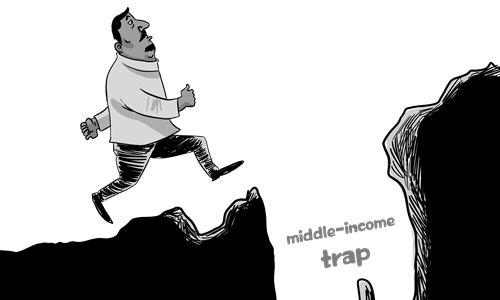HOME >> SOURCE
India embroiled in whirlpool to escape ‘middle-income trap’
By Li Hong Source:Global Times Published: 2019/12/4 20:38:40

Illustration: Luo xuan/GT
Prime Minister Narendra Modi cannot perennially bask in his landslide reelection win, as his government is embroiled in a whirlpool of global trade protectionism and a grave domestic economic slump.
Besieged by Washington's wide-ranging tariff hikes and a precipitous decline of domestic spending, Asia's third-largest economy grew just 4.5 percent in the July-September quarter this year, hitting a 26-quarter low. GDP growth was 7.1 percent in the same period last year.
Slower growth will cause trouble for Modi's government as people will grieve for lost jobs and shrinking wages. Also, a persistent sales lull will lead to the redundant capacity of textile machines, coal mines, steel mills and information technology services, which are major industries in India and at the same time crucial revenue sources for New Delhi.
With a sharply reduced growth rate and lower incomes, a middle class in India will hardly emerge. Without them, the country's emerging urban property market will be disadvantaged, and the gloom will have chilling effect on the economy.
As known to many, urban construction and a real estate boom are key to a major country's economic take-off. It is particularly true for India, as more than 75 percent of the nation's people still toil on farm. Only when half of these rural residents move to cities could India be called a fairly developed country.
When the quarterly growth rate of 4.5 percent was announced, Indian scholars, media pundits and figures from the opposition party bombarded Modi's government. They said the magnitude of the slowdown was "unacceptable" and will seriously hamstring aspirations to grow India's economy to $5 trillion from $2.72 trillion in 2018.
The task facing Modi and his cabinet is an arduous one that calls for the prompt readjustment of policies. Void of policy changes, India's economic boat will have difficulty sailing through the rough seas, as other major Asian economies - including Japan and South Korea - have come to a de facto standstill because of US President Donald Trump's trade wars.
New Delhi should raise the ceiling of its domestic debt and invest more in infrastructure projects. The Reserve Bank of India, the country's central bank, needs to slash benchmark interest rates to lessen the financing burden of Indian businesses, so that the majoring of Indian enterprises can survive a drastic slowdown.
The sharp meltdown of private consumption in India, from a 10.6 percent growth in January-March to a 3.1 percent rise in July-September, indicates that India's economic engine has run into big trouble.
Some Indian economists are worried that the fiscal deficit for the April-October period already hovers at an elevated 103 percent, which is the full-year target. But in such a time of global distress, raising the debt level is warranted. When the economic engine is sputtering, domestic priming is needed.
And, Modi's government needs to revise its geopolitical strategy of always following in the footsteps of the US government.
By refusing to sign on to the RCEP trade pact and shutting its doors to China's Belt and Road Initiative, India has said no to free trade and free investment. Modi's inward-looking foreign policy - putting China at arm's length - will produce a lasting negative impact on its economic revival.
In comparison, the ever closer economic integration of Russia and China has created significantly broader opportunities for both countries.
Whether or not India will overcome its economic malaise and prevent itself from falling into the "middle-income trap" remains to be observed. Will India's current economic storm dissipate on its own? Modi probably knows the answer.
The author is an editor with the Global Times. bizopinion@globaltimes.com.cn
Posted in: COLUMNISTS